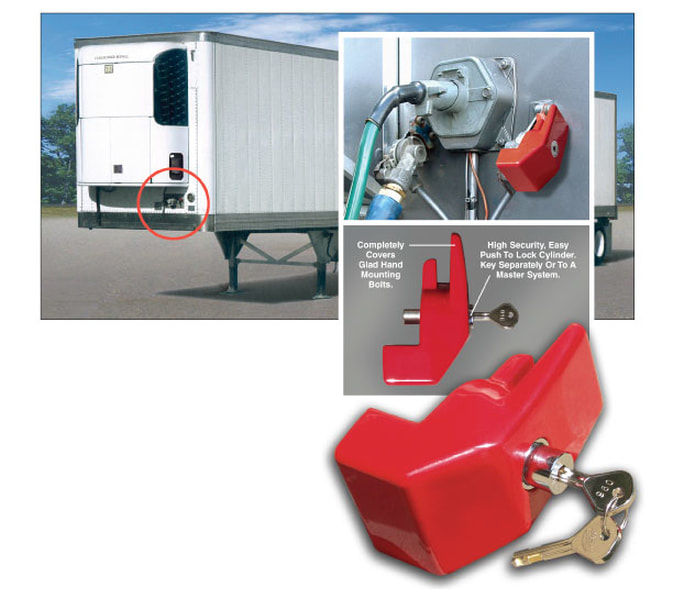
To prevent water and dirt contamination, it is essential to lock the tractor glad hands when not in use. This practice ensures the cleanliness and integrity of the air lines and couplers, reducing maintenance costs and enhancing safety during trailer connections.
Keeping the glad hands locked together or using dummy couplers helps maintain the quality of air and electrical connections, safeguarding against accidents and preserving the effectiveness of the trailer brake system. By securing the glad hands when not in operation, you uphold the reliability and longevity of the equipment, promoting efficient and trouble-free towing experiences.
Navigate As You Want:
Importance Of Locking Tractor Glad Hands
Locking tractor glad hands is crucial for preventing unauthorized tampering, securing trailer brake lines, protecting against water and dirt, maintaining clean air supply, and minimizing maintenance costs. Locking the glad hands with dummy couplers when not in use prevents water and dirt from entering the coupler and air lines, ensuring the quality of air supply. The gladhand lock is applied to the emergency brake connection of the trailer, serving as an excellent way to dead-line a trailer and improving safety. By keeping the couplers clean and free of dirt and grit, these couplers prevent air from escaping, reducing the risk of accidents and minimizing maintenance costs.
How To Use A Glad Hand Lock
| Why Lock Tractor Glad Hands? |
| • Lock glad hands to secure trailer brake lines from tampering. |
| • Prevent water and dirt from entering couplers and air lines. |
| • Use dummy couplers when air lines are disconnected. |
How to Use a Glad Hand Lock:
Apply lock to emergency brake connection on the trailer. Remove before connecting air line to release emergency brakes. Dead-line trailer effectively for safety.
Application to Emergency Brake Connection:
Ensure clean couplers free of dirt and grit before connecting. Snap-lock position with rubber seal prevents air leakage.
Removing Lock Before Connecting Air Line:
Key step in releasing emergency brakes safely. Always remove lock before connecting air line for smooth operation.
Dead-lining a Trailer:
Securing brake lines for safe storage and maintenance. Glad hand lock essential for maintaining trailer integrity.
Function Of Glad Hand On A Trailer
Locking the tractor glad hands or dummy couplers when not in use is essential to maintain air and electrical connections, ensuring safe and efficient trailer connections. This helps prevent water, dirt, and unauthorized tampering, reducing the risk of accidents and minimizing maintenance costs.
| The glad hand on a trailer serves as a coupling device to connect service and supply lines. These couplers have a snap-lock position and a rubber seal to prevent air escape. It is crucial to keep the couplers clean to ensure proper functionality. Locking the tractor glad hands or dummy couplers when not in use is essential to prevent water, dirt, and unauthorized tampering. Using dummy couplers or locks can help maintain the integrity of air and electrical connections, reducing accidents and minimizing maintenance costs. |

Credit: www.amazon.com
Benefits Of Locking Tractor Glad Hands
Locking the tractor glad hands or dummy couplers when not in use is crucial to maintain the quality of air and electrical connections, ensuring safe and efficient trailer connections, reducing the risk of accidents, and minimizing maintenance costs.
Comparison: King Pin Lock Vs. Glad Hand Lock
Why Should You Lock the Tractor Glad Hands
Comparison: King Pin Lock vs. Glad Hand Lock
The purpose of the glad hand lock is to secure the trailer brake lines from unauthorized tampering, preventing trailers from being moved. Locking the glad hands or dummy couplers when not in use is important to prevent water, dirt, and debris from entering the couplers and air lines. This helps maintain the air supply clean. When using a glad hand lock, it is applied to the emergency brake connection of the trailer, and it must be removed before connecting the air line to release the emergency brakes. The glad hand on a trailer functions as the coupling device that connects the service and supply lines to the truck or tractor, with a snap-lock position and rubber seal to prevent air from escaping. Locking the tractor glad hands or dummy couplers when not in use ensures safe and efficient trailer connections, reducing the risk of accidents and minimizing maintenance costs.

Credit: www.youtube.com

Credit: www.transportsecurity.com
Frequently Asked Questions On Why Should You Lock The Tractor Glad Hands
What Is The Purpose Of The Glad Hand Lock?
The primary purpose of a glad hand lock is to secure the trailer brake lines from unauthorized tampering, preventing trailers from being moved. This helps to ensure trailer safety and security. Additionally, it prevents water and dirt from entering the air lines, maintaining the quality of connections and reducing maintenance costs.
Why Should You Lock The Glad Hands Or Dummy Couplers To Each Other When You Are Not Towing Another Vehicle?
When not towing, lock glad hands to keep dirt and water out for cleaner air supply.
How Do You Use A Gladhand Lock?
To use a Gladhand lock, apply it to the trailer’s emergency brake connection and remove it before connecting the air line.
What Is The Function Of The Glad Hand On A Trailer?
The glad hand on a trailer is used to connect the service and supply lines of the trailer to the truck. It has a snap-lock position and a rubber seal to prevent air from escaping. Locking the glad hands prevents water and dirt from getting into the coupler and the air lines.
Conclusion
Locking the tractor glad hands or dummy couplers when not in use is crucial for maintaining the quality of air and electrical connections, ensuring safe and efficient trailer connections, reducing the risk of accidents, and minimizing maintenance costs. This simple practice also prevents dirt and water from infiltrating the lines, contributing to overall safety and functionality.




